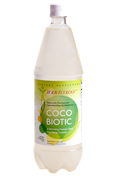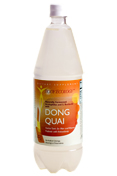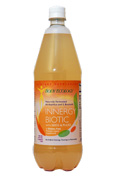Kombucha: What It Is and Its Health Benefits … and Health Drawbacks

Confused about kombucha? Here’s what you need to know before you reach for another bottle of kombucha.
With benefits like improved digestion, better skin, stronger immunity and anti-aging effects, it’s no wonder everyone is finding out about probiotic-rich fermented foods and drinks.
At Body Ecology, fermented foods and drinks are a cornerstone of healing your body and restoring your immunity.
We are excited about the attention probiotics are getting by everyone from doctors to food manufacturers and consumers. With all the products now flooding the market, it’s important to be aware of the quality of probiotics you are consuming in YOUR fermented foods and drinks.
In this article, we’ll answer the question most often asked by our readers…“Is kombucha really good for me?”
All About Kombucha
Kombucha is a fermented tea that has become popular in health food stores and tastes a bit like sparkling apple cider. Consumed for thousands of years, there is a great deal of mystery surrounding kombucha and its health benefits.
Kombucha is fermented from sugar, tea (usually green or black tea) and a live starter.
While some refer to the kombucha starter as a “mushroom,” it is NOT a mushroom, but a symbiotic combination of bacteria and yeast (the acronym used for this combination is SCOBY).
In addition to beneficial bacteria and yeast, kombucha contains gluconic acid, a small amount of alcohol and vinegar. 1 Depending upon how the kombucha is made, it may also contain B vitamins.
People who drink kombucha report benefits like enhanced wellbeing, increased energy and even weight loss. Research has shown that kombucha may have anti-microbial effects against harmful bacteria like E. coli, a range of vitamins and minerals, and possibly anti-fungal properties as well.2,3
Still, there are some reasons that kombucha may not be the ideal probiotic drink, especially if you struggle with candida.
Is Kombucha Good for Me?
Kombucha tea is made from wild, airborne yeast and bacteria that facilitate its fermentation process.
The starter bacteria and yeasts give kombucha its probiotic power, but they are also highly unregulated, not always native to the human intestines, and can change from batch to batch.
Because kombucha is not regulated, there have been some complications reported due to contaminated starters. For example, one widely shared batch led to cutaneous anthrax. Still other batches may have a fungus called aspergillus, which is particularly dangerous for those people who already have compromised immunity.3
While food manufacturers may be able to more easily control the fermentation process, it is much more unpredictable for making kombucha yourself at home.
Here at Body Ecology, we believe that the main reason to be cautious about your consumption of kombucha is because of its “wild fermentation.”
Isn’t All Fermentation The Same?
Just like many wines and beer, the fermentation process of kombucha is considered wild fermentation.
Wild fermentation is when the starter contains airborne yeast, which is considered “wild.”
Airborne yeast can be unpredictable to work with, is not native to the human digestive tract and may cause allergic reactions in people with fungal infections (candida).
Nevertheless, there are some benefits to kombucha because of the beneficial microflora, which is why we recommend that you wait until stage 2 of the Body Ecology program before introducing it into your diet.
In general, we recommend that you avoid any foods that are made using wild, airborne yeast, especially in the initial healing stages of the Body Ecology program.
The following foods and drinks use wild fermentation:
- Kombucha tea
- Kombucha drinks
- Bread
- Distilled spirits
- Rejuvelac
- Wine
- Some beers
So what type of fermentation is beneficial for your health, even on the beginning stages of Body Ecology?
After years of studying the various benefits of healthy bacteria and yeast, our research found that there are certain types of probiotics AND fermentation procedures that create more consistent results, while providing the most health benefits.
Our research led us to recognize 3 key tenets for the best probiotic-rich fermented foods and drinks:
- Starters contain beneficial bacteria and yeast (probiotics) that are able to survive harsh stomach acids to reach the walls of your intestines and recolonize it more effectively.
- Probiotics that are natural to the human GI tract help re-colonize the “good guys” that boost your immunity and your energy.
- Probiotics that are compatible with each other create the greatest synergistic health benefits.
What you want to look for are potent microflora not necessarily large amounts in the billions. This is important to know since there are many probiotic drinks and supplements on the market today that dazzle you with large numbers of colony-forming units (CFUs).
In other words…there may be a lot of them but how effective are they?
However, we also recognize that the reason most people reach for kombucha is the convenience of picking up a ready-made bottle without any hassle. For this reason, Body Ecology has created a line of delicious, convenient ready-made probiotic liquids that can be delivered right to your door.



Want the benefits of probiotics, without the potential sensitivities from drinking kombucha? Choose these delicious ready-made probiotic liquids that satisfy the 3 key tenets for your health. Keep everything else in the picture the same.
Kombucha Ingredients
Besides the wild fermentation, these factors make kombucha products less than ideal for stage 1 of the Body Ecology diet:
- Even after fermentation, kombucha tea still retains too much sugar for the healing purposes of the Body Ecology diet.
- The alcohol content of kombucha tea is somewhat higher than what is produced as a by-product in Young Coconut Kefir and other Body Ecology probiotic liquids.
If you wait until your digestive tract is healed and you are feeling better, you may find that you tolerate kombucha tea and can experience the health benefits.
Drink to Your Health
Fermented foods and drinks provide so many benefits from improved digestion, energy and immunity to more youthful skin and hair. And thankfully, more probiotic-rich products are entering the market to create more options.
As you reach for your probiotic liquids, choose products that meet the 3 tenets for the best probiotic punch for your money and your immunity.
Experiencing the benefits of probiotic-rich fermented foods and drinks are a great way to drink to your health!
Sources:
- Mark Analysis of the Kombucha Ferment, HappyHerbalist.com.
http://www.happyherbalist.com/analysis_of_kombucha.htm - Sreeramulu, G, “Kombucha fermentation and microbial activity,” J Agric Food Chem. 2000 Jun.
http://www.ncbi.nlm.nih.gov/pubmed/10888589 - Analysis of the Kombucha Ferment, HappyHerbalist.com.
- Zeratsky, Katherine, “Kombucha tea: What are the health benefits?” MayoClinic.com.
http://www.mayoclinic.com/health/kombucha-tea/AN01658








